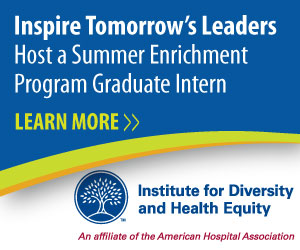
- Program Spotlight:
Redesigning Care Today to Achieve Patient Safety - 2023 Executive Program: Preparing Leaders for the Future
- Meet ACHE’s New Elected Officials
- Reminder: ACHE Graduate Student Scholarship Applications Due Next Week
- Build Your Expertise With Digital Self-Study Courses
- Designing a Digital Health Intersection for Women’s Health
Program Spotlight:
Redesigning Care Today to Achieve Patient Safety
Pediatric mental health and violence against clinicians are among the top pressing issues facing health system leaders this year, according to the Emergency Care Research Institute’s 2023 list of top 10 patient safety concerns. The ECRI report, released March 13, stems from recent studies, patient safety databases and in-depth conversations with stakeholders in the field. Other concerns on the 2023 list include industrywide challenges such as delayed sepsis treatment, medication errors and preventable harm due to missed care.
Despite epidemic levels of staff burnout and turnover, care redesign efforts that are underway or being planned to improve patient safety and quality should continue, according to experts in the March/April Healthcare Executive cover story “Necessary Change: Redesigning Care to Achieve Patient Safety.” The increased use of travel nurses and other temporary workers due to staffing shortages can affect teamwork and communication. “Labor challenges are creating a transitional workforce, which poses risks to patient safety and threatens the safety culture within our institutions,” says Kedar Mate, MD, president and CEO, Institute for Healthcare Improvement, Boston.
To address patient safety issues, including some of the challenges listed in the ECRI report such as preventable harm due to missed care, experts recommend the use of quality-improvement methodologies such as Lean and Plan-Do-Study-Act. Although these methodologies have become ubiquitous in hospitals, Mate thinks these approaches should be used more broadly not only to eliminate harm but also to proactively ensure care is provided the right way more often through the use of data and learning networks.
Although the majority of care redesign is about incremental improvement or tweaking processes gradually over time, sometimes a transformative redesign is needed to achieve desired outcomes. For example, the Cleveland Clinic recently redesigned its sepsis response approach to ensure the deadly infections are caught early, when most treatable.
Visit HealthcareExecutive.org to read the cover story and learn more about how to pilot a care redesign intervention.
2023 Executive Program: Preparing Leaders for the Future
Meet the challenges of tomorrow with bold new solutions gained through the 2023 Executive Program, offered virtually and in-person. Designed for three cohorts—executive, senior executive and clinical executive—the Executive Program allows all participants to earn up to 40 ACHE Face-to-Face Education and interprofessional continuing education credits. Both program formats feature resources and discussions that deliver unique insights on topics relevant to specific challenges healthcare leaders face, as well as professional assessments and individualized coaching sessions to support professional growth.
Virtual Executive Program, April 11–June 8
Composed of a series of online sessions taking place between April 11 and June 8, the Virtual Executive Program helps the next generation of leaders prepare for the complex, ever-changing healthcare environment. Led by expert faculty, the Virtual Executive Program’s structured, interactive sessions give participants the opportunity to make lifelong connections and position themselves and their organizations for success.
In-Person Executive Program, June 25–Oct. 24
A unique, immersive learning experience for healthcare leaders, the In-Person Executive Program comprises three in-person modules in June (Atlanta), August (Chicago) and October (Houston), with intermittent virtual education between sessions. Each module features in-person site visits to top healthcare institutions and one-on-one coaching and advising to help leaders face today’s most pressing challenges.
Registration closes June 21 for the in-person program, for which attendance is limited to maintain a collegial environment. A limited number of scholarships are available for this program for people whose organizations lack the resources to fully fund their tuition. Scholarship applications are due April 10.
Visit ache.org/ExecutivePrograms to learn more and register. For questions, more information or assistance in deciding which cohort or program is right for you, please contact Alexa Calingo at acalingo@ache.org.
Meet ACHE’s New Elected Officials
ACHE’s 2023–2024 Chair Officers were installed March 18 during the Council of Regents meeting preceding ACHE’s 66th Congress on Healthcare Leadership. They are:
- Chair: Delvecchio S. Finley, FACHE, president, Atrium Health Navicent, Macon, Ga.
- Chair-Elect: William P. Santulli, FACHE, president, Advocate Health-Midwest Region, Downers Grove, Ill.
- Immediate Past Chair: Anthony A. Armada, FACHE, executive vice president and chief transformation officer, Generations Healthcare Network, Lincolnwood, Ill.
Get to know Finley a little better in this profile about his professional journey and his plans for ACHE in the year ahead.
Additionally, four new Governors were elected to serve three-year terms on the Board of Governors: They are:
- Thomas B. Lanni Jr., FACHE, president, Corewell Health Beaumont Hospital, Troy (Mich.).
- Karin Larson-Pollock, MD, FACHE, chief, outcomes analytics/chief quality officer, North Division, Providence, Seattle.
- Frances C. Roesch, FACHE, director, Administration, Department of Obstetrics and Gynecology, Faculty of Health Sciences, McMaster University/business manager, Hamilton Obstetrics and Gynecology Associates, Hamilton, Ontario.
- Solomon A. Torres, FACHE, deputy executive director/COO, Brookdale University Hospital Medical Center, New York City.
Finally, 28 Fellows were elected to serve three-year terms as ACHE Regents and four Regents-at-Large were appointed. Four Regents were also appointed on an interim basis.
Visit ache.org/Leadership to learn more about the 2023–2024 Board of Governors and Council of Regents. ACHE thanks Board members and Regents who completed their terms in 2023 for their commitment to healthcare leadership.
Reminder: ACHE Graduate Student Scholarship Applications Due Next Week
The March 31 deadline is quickly approaching for students who wish to apply for 2023 Dent and McGaw scholarships. Offered annually, the Albert W. Dent and Foster G. McGaw Graduate Student Scholarships are awarded to outstanding students enrolled in their final year of graduate programs in healthcare management to help finance their education. The Albert W. Dent Student Scholarship is designated for racially and/or ethnically diverse, as well as LGBTQ+ students, only. Every year, ACHE awards up to a total of 15 scholarships, each worth $5,000.
To learn more, visit the Albert W. Dent and Foster G. McGaw Graduate Student Scholarship webpages for more information.
Build Your Expertise With Digital Self-Study Courses
ACHE’s Digital Self-Study Courses allow participants to set their own pace while developing the leadership and management skills needed to advance their careers. Each course is worth 6 ACHE Qualified Education credits that can be applied toward advancement or recertification as a Fellow of ACHE.
Courses explore timely topics and healthcare management fundamentals such as physician engagement, improving clinical performance and reducing burnout in the workforce. Each course includes:
- Instructions on how to complete the course and earn credits.
- Course material, including required readings from the corresponding Health Administration Press book and any additional reading.
- An assessment.
- A course evaluation form.
Upon purchasing a self-study course, participants will see the course in the “My Online Learning” section of their My ACHE account. From there, they will be directed to ACHE’s learning management system to complete the course within 180 days from the date of purchase. Upon completion of the course, 6 ACHE Qualified Education credits will be applied automatically toward advancement or recertification as an ACHE Fellow.
For more information, visit ache.org/SelfStudy. For any questions, please email selfstudy@ache.org.
Designing a Digital Health Intersection for Women’s Health
“Women of all ages in low-income neighborhoods and countries are less likely to own digital technologies than their male counterparts, so it is no surprise that women lack control over their individual potential to engage in digital health and digital health products that could increase their overall well-being,” writes Samantha E. Elder, U.S. vice president of marketing and communication with the Organization for the Review of Care and Health Apps, in a recent ACHE Blog post. “This disproportionate ownership demonstrates or reinforces a key theme—access.”
To recognize Women’s History Month, we are sharing Elder’s blog post, which calls attention to the fact that many women do not benefit from the full potential of digital health due to lack of accessibility and support or championing from stakeholders, including employers and communities. Elder calls on healthcare professionals across the field to ensure the health system works for everyone, including women, and offers a few first steps that can be taken to move toward positive gender relations. For example, health application developers must ensure their tools provide safety and privacy, efficacy and accessibility to guarantee that women and other underprivileged groups have adequate access.
Visit ache.org/Blog to read the blog post.


